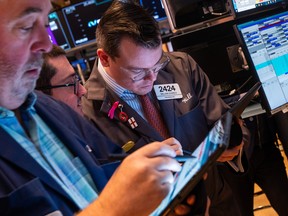Article content
By Julie Cazzin with Felix Narhi
Q: What is a “behavioural edge” in investing? How does it potentially enhance returns? How can an investor develop it? — Giovanni

Temperament is the unsung hero of investing success
By Julie Cazzin with Felix Narhi
Q: What is a “behavioural edge” in investing? How does it potentially enhance returns? How can an investor develop it? — Giovanni
Article content
FP Answers: Giovanni, the term behavioural edge is just another way of saying “temperament,” which refers to the habitual way a person behaves in each situation. For example, one person may be easygoing and relaxed while another is more likely to be impatient and assertive.
Advertisement 2
Article content
Temperament is the unsung hero of investing success. Gaining insight about our innate emotional temperament and learning how to work with it gives investors an edge.
The common misconception is that you need a high level of intelligence to be a successful investor. No doubt, that can be helpful, but based on many years in the industry, I’ve seen it is not always the most important differentiator.
Article content
Once someone has at least an average level of intelligence, it is temperament that often provides the investing edge in leading to better returns over the long term. “Investing is not a business where the guy with the 160 IQ beats the guy with the 130 IQ,” famed investor Warren Buffett has pointed out.
Having the right temperament can potentially enhance investment returns in several ways. An investor who is very reactive to external events is likely to fare poorly over the long term because, quite simply, the world is full of uncertainty and always will be. Markets are highly reactive, abetted by algorithmic trading and automatic rebalancing by exchange-traded funds. Individual investors should not be.
Article content
Advertisement 3
Article content
Research shows that investors who trade frequently or try to time the market underperform. On the other hand, those investors who can remain calm and patient throughout market cycles do better because markets historically trend upwards. Hands down, being calm, cool and collected is the right temperament for an investor to have.
The concept of “homo economicus” — or economic man — describes a hypothetical person who consistently makes rational decisions. In real life, our decisions are coloured by our formative experiences, moods, external circumstances, what we ate for lunch and a host of other factors. These influences drive our behaviours, but they often operate below conscious awareness (even artificial-intelligence apps “hallucinate”).
Given that behaviour is some combination of cognitive and emotional inputs, an investor can create an edge by developing a disciplined investment process that overrides temperament, especially during highly volatile periods.
The term “active patience” means being clear about your investment principles and what you are looking for, and practicing active patience until the right opportunity arises.
Advertisement 4
Article content
In contrast, regular patience is making an investment decision and sticking with it no matter what, even if it was the wrong decision. The latter approach is unlikely to bring financial success, which is the major goal of investing.
Active patience is what Buffett would call the “fat pitch,” which occurs when the market (occasionally) presents a very attractive opportunity. It is easy to spot a great opportunity and take full advantage of it when an investor has clear principles on what they are looking for.
Can we change our temperament? Recent studies show that personality traits and moods are subject to change, sometimes within the hour, so temperament may not be as fixed as we’ve been led to believe.
Becoming a better investor starts with self-knowledge — and lots of practice. The behavioural traits associated with good investment outcomes are patience, discipline, emotional control and risk awareness. It so happens, these qualities lead to good life outcomes, too. A calm temperament is the bedrock of making sound investment decisions.
Every investor must determine for themselves how to achieve greater equanimity and there is no shortage of books, videos and TikTok tutorials on that evergreen topic. I would also add the importance of staying humble.
Advertisement 5
Article content
Recommended from Editorial
In investing, as in life, the learning never stops. Staying open to new information and having the courage to challenge our own and others’ beliefs and habitual behaviours are the keys to future success.
Felix Narhi is chief investment officer and portfolio manager at PenderFund Capital Management Ltd.
Bookmark our website and support our journalism: Don’t miss the business news you need to know — add financialpost.com to your bookmarks and sign up for our newsletters here.
Article content

TORONTO – Canada’s main stock index was up more than 100 points in late-morning trading, helped by strength in base metal and utility stocks, while U.S. stock markets were mixed.
The S&P/TSX composite index was up 103.40 points at 24,542.48.
In New York, the Dow Jones industrial average was up 192.31 points at 42,932.73. The S&P 500 index was up 7.14 points at 5,822.40, while the Nasdaq composite was down 9.03 points at 18,306.56.
The Canadian dollar traded for 72.61 cents US compared with 72.44 cents US on Tuesday.
The November crude oil contract was down 71 cents at US$69.87 per barrel and the November natural gas contract was down eight cents at US$2.42 per mmBTU.
The December gold contract was up US$7.20 at US$2,686.10 an ounce and the December copper contract was up a penny at US$4.35 a pound.
This report by The Canadian Press was first published Oct. 16, 2024.
Companies in this story: (TSX:GSPTSE, TSX:CADUSD)
The Canadian Press. All rights reserved.

TORONTO – Canada’s main stock index was up more than 200 points in late-morning trading, while U.S. stock markets were also headed higher.
The S&P/TSX composite index was up 205.86 points at 24,508.12.
In New York, the Dow Jones industrial average was up 336.62 points at 42,790.74. The S&P 500 index was up 34.19 points at 5,814.24, while the Nasdaq composite was up 60.27 points at 18.342.32.
The Canadian dollar traded for 72.61 cents US compared with 72.71 cents US on Thursday.
The November crude oil contract was down 15 cents at US$75.70 per barrel and the November natural gas contract was down two cents at US$2.65 per mmBTU.
The December gold contract was down US$29.60 at US$2,668.90 an ounce and the December copper contract was up four cents at US$4.47 a pound.
This report by The Canadian Press was first published Oct. 11, 2024.
Companies in this story: (TSX:GSPTSE, TSX:CADUSD)
The Canadian Press. All rights reserved.

TORONTO – Canada’s main stock index was little changed in late-morning trading as the financial sector fell, but energy and base metal stocks moved higher.
The S&P/TSX composite index was up 0.05 of a point at 24,224.95.
In New York, the Dow Jones industrial average was down 94.31 points at 42,417.69. The S&P 500 index was down 10.91 points at 5,781.13, while the Nasdaq composite was down 29.59 points at 18,262.03.
The Canadian dollar traded for 72.71 cents US compared with 73.05 cents US on Wednesday.
The November crude oil contract was up US$1.69 at US$74.93 per barrel and the November natural gas contract was up a penny at US$2.67 per mmBTU.
The December gold contract was up US$14.70 at US$2,640.70 an ounce and the December copper contract was up two cents at US$4.42 a pound.
This report by The Canadian Press was first published Oct. 10, 2024.
Companies in this story: (TSX:GSPTSE, TSX:CADUSD)
The Canadian Press. All rights reserved.


Defying Convention to Deepen Connections: Booking.com’s 8 Travel Predictions for 2025


After hurricane, with no running water, residents organize to meet a basic need


In The Rings: Curling Canada still looking for Canadian Curling Trials title sponsor


N.B. election debate: Tory leader forced to defend record on gender policy, housing


Alberta government shifts continuing care from Health to Seniors Ministry


Buhai, Green and Shin lead in South Korea after 8-under 64s in first round


Manitoba government halts school building plan, says other methods will be found


‘Significant overreach’: Ontario municipalities slam province over bike lane rules
Comments